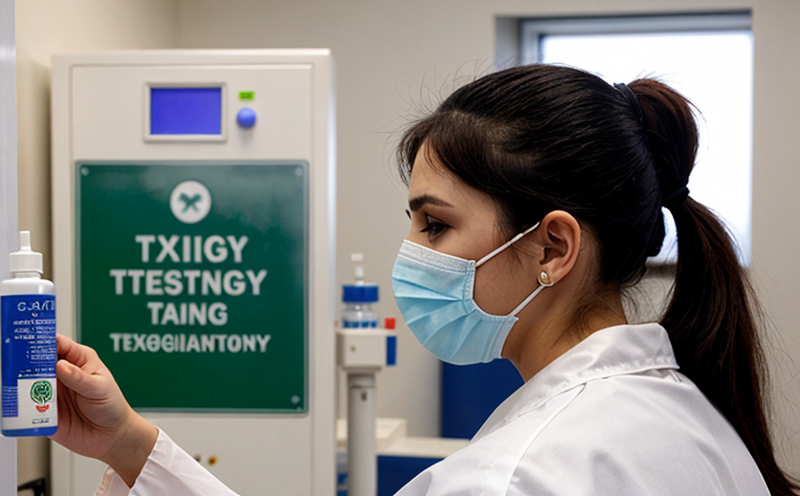In Vitro ADME Toxicology Testing
In vitro ADME (Absorption, Distribution, Metabolism, and Excretion) toxicology testing is a critical aspect of pharmaceutical development. This approach allows for the early identification of potential safety issues with new drug candidates before they reach extensive animal or clinical trials.
The in vitro ADME toxicology tests are conducted using human cell lines or tissues that mimic the physiological conditions of the target organ, thus providing more accurate predictions about a compound's behavior within the human body. These tests help to assess the potential toxicity and pharmacokinetic properties of compounds at an early stage.
The process typically involves multiple steps, including initial screening for cell viability, followed by incubation with test compounds under controlled conditions. The cells are monitored over time to observe changes in their morphology and metabolic activity. This data is then used to determine the compound's potential for causing adverse effects on various organ systems.
The importance of this testing cannot be overstated, particularly given that a significant portion of drugs fail at later stages due to safety concerns. By employing in vitro ADME toxicology tests early in the development process, pharmaceutical companies can save time and resources while enhancing patient safety.
Moreover, these tests comply with international standards such as OECD 439 and ASTM E1760, which ensure that the results are reliable and reproducible. The use of human-derived cells also aligns with ethical considerations by minimizing the need for animal testing.
| Standard | Description |
|---|---|
| OECD 439 | Guidelines for in vitro toxicity testing using human hepatocytes. |
| ASTM E1760 | Standard practice for the use of cell-based in vitro methods to assess the potential for drug-induced liver injury. |
Why It Matters
The significance of in vitro ADME toxicology testing lies in its ability to provide comprehensive insights into a compound's potential for causing adverse effects. This information is crucial for guiding the development process and ensuring that only safe and effective drugs proceed to further stages of clinical trials.
By using this approach, pharmaceutical companies can mitigate risks associated with late-stage failures due to safety issues. It also helps in optimizing drug formulations by identifying potential liabilities early on. This not only enhances the overall quality of medicines but also contributes significantly to patient safety and satisfaction.
The results from these tests are used to inform decisions about dosage levels, formulation adjustments, and even the selection of target populations for clinical trials. The data generated can be instrumental in regulatory submissions, ensuring compliance with stringent safety standards set by agencies like the FDA or EMA.
Furthermore, in vitro ADME toxicology testing supports ethical considerations by reducing the reliance on animal models. This approach aligns with global trends toward more humane and efficient drug development practices.
Applied Standards
| Standard | Description |
|---|---|
| ICH S7B | Guidance on the use of in vitro tests for predicting human drug-induced toxicity. |
| ISO 10993-25 | Biocompatibility evaluation: Particular aspects related to ADME testing. |
The application of these standards ensures that the tests are conducted with high precision and accuracy. Compliance with international guidelines like ICH S7B allows for better communication between regulatory authorities, researchers, and pharmaceutical companies, facilitating smoother drug development processes.
Eurolab Advantages
At Eurolab, we pride ourselves on offering cutting-edge in vitro ADME toxicology testing services. Our state-of-the-art facilities and experienced team of scientists ensure that every test is conducted to the highest standards.
We employ advanced technologies such as microfluidic systems and automated imaging techniques to enhance accuracy and efficiency. Our comprehensive approach includes not only primary cell cultures but also organ-on-a-chip models, which provide a more holistic view of drug behavior within the human body.
Our services are designed to meet the diverse needs of our clients, whether they are small biotech companies or large pharmaceutical giants. We offer flexible packages tailored to specific project requirements and timelines. Our commitment to quality is reflected in our stringent quality management systems that comply with ISO 9001.
Client satisfaction is at the heart of everything we do. We provide detailed reports, including raw data and interpretations, ensuring transparency throughout the process. This approach fosters trust and long-term relationships with our clients.
Our expertise in this field extends to various therapeutic areas, from oncology to neurology, making us a versatile partner for your pharmaceutical testing needs. Whether you require single-parameter tests or comprehensive multi-parameter evaluations, Eurolab has the capability to meet your requirements.





